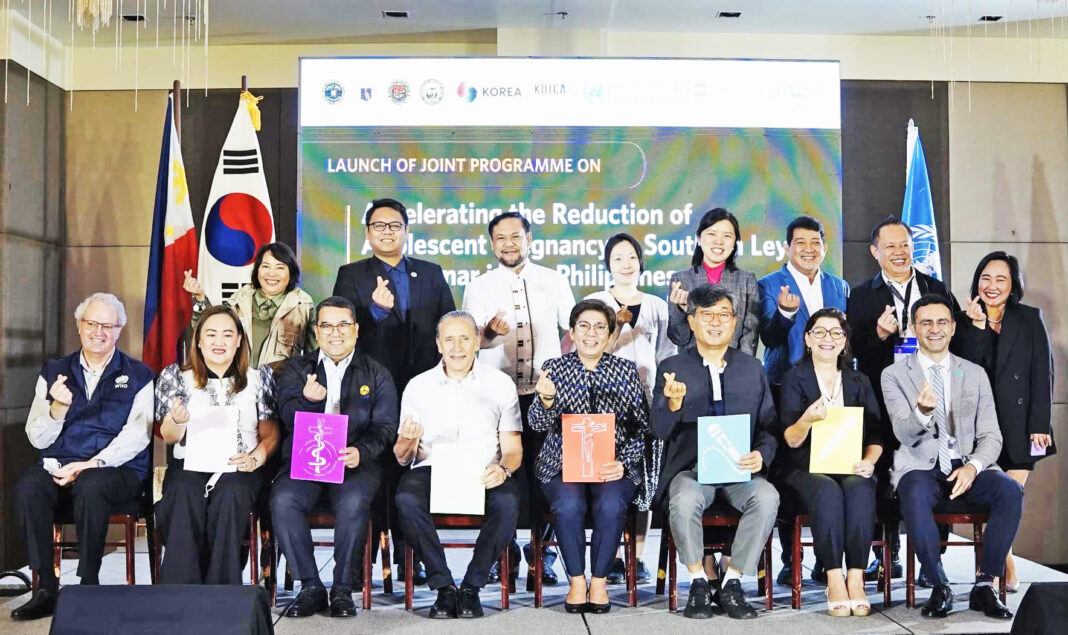THE KOREA International Cooperation Agency (KOICA) partnered with three agencies under the United Nations, the Philippine government and the provincial governments of Samar and Southern Leyte to implement a four-year program to slow down teenage pregnancy in the two provinces.
The joint program, “Accelerating the Reduction of Adolescent Pregnancy in Southern Leyte and Samar in the Philippines,” aims to improve access of the adolescent population to sexual and reproductive health (SRH) services and information, to raise their self-awareness on sexual and reproductive health and rights, as well as to enhance leadership and governance on ASRH.
The program was launched last February 20, 2023 with Department of Health Officer-In-Charge Dr. Maria Rosario Singh-Vergeire, UN Resident Coordinator Gustavo Gonzalez, KOICA Country Director Kim Eunsub, Country Representative of the United Nations Population Fund Dr. Leila Joudane, United Nations Children’s Fund (UNICEF) Philippines Deputy Representative Behzad Noubary and officials from the Department of Interior and Local Government and Department of Education.
Vergeire said pregnancy during adolescence increases the risk of maternal mortality during childbirth citing the 2020 civil registration and vital statistics, wherein 159 women aged 15 to 19 died during childbirth, 6% of all deaths for that particular age group.
The Philippines is also among the highest in the Asia-Pacific region with unmet need for family planning among young women aged 15-19 at 27.9%, significantly higher than the 16.7% average of any other age group.
Joudane says the Philippines loses an estimated PHP 33 billion a year due to loss of opportunities from early and adolescent pregnancy.
“When a girl gets pregnant very early, she will also earn a lot less than a girl that went on to study,” Joudane said.
The program is set to run from 2023 to 2026, covering 18 municipalities and one city or 500 barangays in Southern Leyte, and 24 municipalities and one city, or 951 barangays in Samar.
“We are focusing on these two areas because of the geographic disadvantage of these areas especially here in Region 8 where for all these numbers of calamities and disasters, access to health facilities will be lesser compared to other regions,” Vergeire said.
Dr. Feliciano Matibag, provincial health officer of Southern Leyte, said teenage pregnancy in his province is increasing which the local government unit wants to curb.
“We try to look at the receiver’s side, which is really for teenagers to be informed, to be properly aware, and to be educated so they know their rights to access the health services provided for them,” Matibag said.
“And on the health providers’ side, we should capacitate the health care providers, giving them the best intentions to serve this cause for the teenagers to receive whatever unmet needs they have in terms of sexual and reproductive health,” he added.
Eunsub said KOICA believes that the joint efforts of both the UN agencies and the Philippine government through this project can create a crucial and positive impact to the protection and reproductive health of Filipino adolescents.
UN Philippines Resident Coordinator Gonzales says adolescent pregnancy is not only a health and education challenge but also an economic development issue. “We are hoping that this program with KOICA, we will be able to reduce adolescent pregnancy and support the Philippines in maximizing the ‘demographic dividend’,” Eunsub closed. By Elmer Recuerdo (EV Mail Feb. 20-26, 2023 issue)


